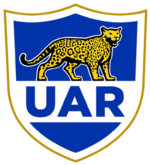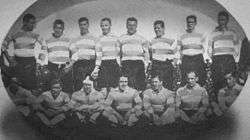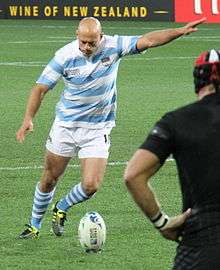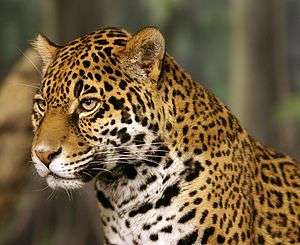Argentina national rugby union team
 | |||
| Nickname(s) | Los Pumas | ||
|---|---|---|---|
| Emblem | Yaguarete | ||
| Union | Unión Argentina de Rugby | ||
| Head coach | Daniel Hourcade | ||
| Captain | Agustín Creevy | ||
| Most caps | Felipe Contepomi (87) [1][2][3] | ||
| Top scorer | Felipe Contepomi (651) [4][5][6] | ||
| Top try scorer | José María Núñez Piossek (30) | ||
| Home stadium | Estadio José Amalfitani | ||
| |||
| World Rugby ranking | |||
| Current | 9 (as of 21 November 2016) | ||
| Highest | 3 (2008) | ||
| Lowest | 12 (2014) | ||
| First international | |||
|
Argentina 3–28 British Isles (12 June 1910) | |||
| Biggest win | |||
|
Argentina 152–0 Paraguay (1 May 2002) | |||
| Biggest defeat | |||
|
New Zealand 93–8 Argentina (21 June 1997) | |||
| World Cup | |||
| Appearances | 8 (First in 1987) | ||
| Best result | Third place, 2007 | ||
| Website | www.uar.com.ar | ||
The Argentina national rugby team, officially nicknamed Los Pumas, represents Argentina in international rugby union matches. The team, which plays in sky blue and white jerseys, is organised by the Argentine Rugby Union (UAR, from the Spanish: Unión Argentina de Rugby).
Argentina played its first international rugby match in 1910 against a touring British Isles team. As of November 2015 they are ranked 5th in the world by the IRB, making them the highest-ranked nation in the Americas. They have competed at every Rugby World Cup staged since the inaugural tournament of 1987, and the country may be considered the strongest within the Americas in all-time World Cup competition, undefeated against all but Canada, against whom they have suffered three losses.
Although rugby union is nowhere near as popular as football in Argentina, Los Pumas' impressive results since the 1999 World Cup have seen the sport's popularity grow significantly. Argentina has achieved several upset victories, are tough contenders when playing in Buenos Aires, and are fully capable of regularly defeating Six Nations sides. A surprise victory over the hosts France in the first game of the 2007 World Cup took Argentina to fourth in the IRB World Rankings. The team were undefeated in their pool, and reached the semi-finals for the first time, beating Scotland 19–13 in their quarter-final. They were defeated 37–13 by eventual winners South Africa in the semi-finals, but followed this up with a second win over France to claim third place overall.
In March 2008 the team reached an all-time high of third in the IRB World Rankings.
After their advances in competitiveness and performance during the 2000s, coupled with their location in the Southern Hemisphere, Argentina was the only tier 1 nation that had no regular competition, and some, among them former Pumas captain Agustín Pichot,[7] have even spoken of them joining the Six Nations. Argentina officially joined The Rugby Championship in a meeting in Buenos Aires on November 23, 2011.[8] In their first tournament in 2012, Argentina secured a 16–16 draw with The Springboks in only their second game.
The 2014 Rugby Championship saw the first Championship-match win for Argentina who defeated Australia 21–17.[9] 2015 proved to be a very successful year for Argentine rugby, as the last match of the 2015 Rugby Championship was Argentina's first ever win over South Africa, where the Pumas defeated the Springboks 37–25 in Durban, and reached another semifinal at the 2015 Rugby World Cup. In the 2016 Rugby Championship, the Pumas split the first two games with the Springboks, winning the second game 26-24 at Salta on August 27, 2016.
History

The History of the Argentina national team starts with the first international played by an Argentine side v. the British Islands in 1910 when they toured on South America. Argentina gained recognition in 1965, when the team toured South Africa playing a series of friendly matches there. In that tour the national team was nicknamed Los Pumas, a name that became an identity mark for Argentina, remaining to present days.
Argentina has taken part in all the Rugby World Cups since the first edition in 1987, being their best performance the 3rd. place achieved in 2007.
Argentina followed their growing competitiveness in the Rugby Championship with a strong showing in the 2015 World Cup, reaching the semi-finals for the second time.
The national side also plays the Rugby Championship since the 2012 edition, after joining the competition one year before.[10]
Colours, symbol and name
Argentina alternated blue and white jerseys during its first international matches in 1910. In 1927 Mr. Abelardo Gutiérrez of Gimnasia y Esgrima de Buenos Aires proposed that Argentina should play against British Lions in a striped white and light blue jersey. That request was accepted and Argentina wore the striped uniform for the first time in its history.[11]
Los Pumas play in a shirt in the country's flag (and sporting) colours of light blue and white, white shorts, and socks in light blue and white. In 2011, the UAR signed a deal with Nike which became the exclusive kit provider for all its national senior and youth teams, including Pampas XV.[12] The first uniform designed by the American company left the traditional horizontal-striped jersey behind, featuring a single light blue with white shoulders jersey, although it was announced that Los Pumas will wear its traditional uniform again when they play the 2012 Rugby Championship.[13]
On September 1941, Abelardo Gutiérrez (who had proposed the use of a white and blue jersey for the team 14 years prior) suggested a badge with the figure of a lion. The color of the crest was blue (due to Buenos Aires Cricket Club, where the first rugby match in Argentine had been played). The animal was later replaced by a native to Argentine species, so the jaguar was chosen due to his "agility and courage", according to their words.[11]
The Pumas nickname is the result of an error made by Carl Kohler, a journalist for the then Die Transvaler newspaper in South Africa, while following the team during their first overseas tour ever – to Southern Africa in 1965. He tried to devise a catchy nickname for the team similar to existing international team nicknames such as All Blacks, Springboks, and Wallabies. He asked Isak van Heerden, the then coach of the Natal Rugby team who was asked by the SARB to assist with the tour, for ideas. They saw a picture of a type of lion with spots on the UAR crest. Kohler was aware that the Americas had jaguars and pumas, and as he was under pressure to submit his article, made a guess and called them the Pumas, instead of the actual jaguar. The mistake stuck, and was eventually adopted by the Argentines themselves (although the UAR crest still depicts a jaguar).[14]
Uniform evolution
1910–27 1 |
1910–27 1 |
1927–present |
2012–15 |
- Notes:
- 1 The team alternated white and blue jerseys during that period.
Kit suppliers
| Period | Kit manufacturer | Shirt sponsor |
|---|---|---|
| 1978 – 1998 | Adidas | No shirt sponsor |
| 1999 – 2000 | VISA | |
| 2000 – 2003 | Topper | |
| 2004 – 2011 | Adidas | |
| 2012 – present | Nike, Inc |
Home grounds


The Pumas use a variety of stadiums when playing at home. One of the most frequently used for tests is Estadio José Amalfitani, home of Club Atlético Vélez Sársfield and sited in Buenos Aires. When Great Britain first came to Argentina in the 1910 tour, the national team played at Polo Ground of Flores among other stadiums.[15]
When the British combined returned to Argentina in 1927, the national side started to use GEBA and Buenos Aires Cricket Club as their home venues. GEBA was a frecquent venue during the next decades, but hosted only three matches after the 1960s, as the Pumas started using larger stadiums; the Pumas' last match at GEBA was in 1993.[16] On the other side, the Buenos Aires Cricket was also used for a large number of matches until 1948 when it was destroyed by the fire in 1948.[17][18]
In 1997 BACRC inaugurated the first purpose-built rugby union stadium in Argentina, erected in Los Polvorines, Greater Buenos Aires. A total of nine international games were played there by the national team until 2005 when it was sold.[19]
Los Pumas played in Ferro Carril Oeste stadium during the 1970s and 1980s, where Argentina played Ireland, New Zealand, France and Australia among others.[20][21]
During the mid year tests in 2007, as well as Vélez Sársfield, Argentina played games at venues including Brigadier Estanislao López in Santa Fe, Malvinas Argentinas in Mendoza, and Gigante de Arroyito, in Rosario. Argentina have also used the River Plate Stadium in the past, and in 2006 hosted Wales at Estadio Raúl Conti in Puerto Madryn.
Record
Overall
Argentina have won 223 of their 417 Test matches, a win record of 53.61%. When the world rankings were introduced by the IRB in October 2003, Argentina were ranked seventh. They fell to eighth in the rankings in June 2004, before rising back to seventh by November that year. They fell back to eighth in February 2005, and stayed there until falling to their lowest ranking of ninth in February 2006. Since then, Argentina rose to eighth in July 2006, then sixth in November of that year. They had a one-week fall to seventh, then one week later rose to fifth to start the World Cup 2007.
Los Pumas twice surpassed their highest ranking at the 2007 Rugby World Cup.[22] Defeating number three France, the second opening game loss for a World Cup hosting nation, moved them into fourth place, their highest position since the IRB World Rankings were established. They lost to eventual champions South Africa in the semi-final but beat France yet again in the bronze medal round to set another highest ranking, third, behind South Africa and New Zealand.
Argentina has won every match against South American national teams, including 31 against Uruguay, 28 against Chile, 16 against Paraguay and 11 against Brazil. In contrast, they have never beaten New Zealand, having scored a draw against them.
Below is table of the representative rugby matches played by an Argentina national XV at test level up until 26 November 2016.[23]
| Top 30 rankings as of 5 December 2016[24] | |||
| Rank | Change* | Team | Points |
| 1 | 94.78 | ||
| 2 | 89.84 | ||
| 3 | 86.97 | ||
| 4 | 84.62 | ||
| 5 | 82.55 | ||
| 6 | 81.79 | ||
| 7 | 80.67 | ||
| 8 | 80.13 | ||
| 9 | 79.91 | ||
| 10 | 76.46 | ||
| 11 | 74.22 | ||
| 12 | 74.14 | ||
| 13 | 72.47 | ||
| 14 | 71.94 | ||
| 15 | 71.25 | ||
| 16 | 69.36 | ||
| 17 | 64.66 | ||
| 18 | 63.95 | ||
| 19 | 63.25 | ||
| 20 | 62.78 | ||
| 21 | 60.66 | ||
| 22 | 60.17 | ||
| 23 | 59.28 | ||
| 24 | 58.99 | ||
| 25 | 56.97 | ||
| 26 | 56.87 | ||
| 27 | 56.50 | ||
| 28 | 55.50 | ||
| 29 | 55.08 | ||
| 30 | 54.93 | ||
| *Change from the previous week | |||
| Argentina's historical rankings | |||
 | |||
| Source: World Rugby - Graph updated to 14 November 2015[24] | |||
| Opponent | Played | Won | Lost | Drawn | Win % | For | Aga | Diff |
|---|---|---|---|---|---|---|---|---|
| | 27 | 5 | 21 | 1 | 18.52% | 428 | 742 | -314 |
| | 13 | 13 | 0 | 0 | 100.00% | 1054 | 47 | +1007 |
| British and Irish Lions | 6 | 0 | 6 | 0 | 0.00% | 6 | 211 | -205 |
| | 8 | 6 | 2 | 0 | 75.00% | 262 | 137 | +125 |
| | 37 | 37 | 0 | 0 | 100.00% | 1716 | 243 | +1473 |
| | 20 | 4 | 15 | 1 | 20.00% | 296 | 515 | -219 |
| | 1 | 0 | 0 | 1 | 0.00% | 13 | 13 | +0 |
| | 4 | 3 | 1 | 0 | 75.00% | 130 | 96 | +34 |
| | 50 | 14 | 35 | 1 | 28.00% | 784 | 1215 | -431 |
| | 4 | 4 | 0 | 0 | 100.00% | 141 | 37 | +104 |
| | 16 | 6 | 10 | 0 | 37.50% | 330 | 351 | -21 |
| | 5 | 2 | 2 | 1 | 40.00% | 25 | 36 | -11 |
| | 21 | 15 | 5 | 1 | 71.43% | 526 | 368 | +158 |
| | 6 | 5 | 1 | 0 | 83.33% | 259 | 159 | +100 |
| Junior Springboks | 5 | 1 | 4 | 0 | 20.00% | 26 | 166 | -90 |
| | 3 | 3 | 0 | 0 | 100.00% | 194 | 36 | +158 |
| | 24 | 0 | 23 | 1 | 0.00% | 333 | 974 | -641 |
| | 4 | 0 | 4 | 0 | 0.00% | 30 | 80 | -50 |
| Oxford and Cambridge | 8 | 2 | 5 | 1 | 25.00% | 48 | 126 | -78 |
| | 17 | 17 | 0 | 0 | 100.00% | 1382 | 65 | +1317 |
| | 1 | 1 | 0 | 0 | 100.00% | 44 | 0 | +44 |
| | 8 | 8 | 0 | 0 | 100.00% | 317 | 97 | +220 |
| | 4 | 1 | 3 | 0 | 25% | 82 | 111 | -29 |
| | 16 | 9 | 7 | 0 | 56.25% | 284 | 328 | -44 |
| | 3 | 1 | 2 | 0 | 33.33% | 34 | 21 | +13 |
| | 24 | 2 | 21 | 1 | 8.33% | 472 | 857 | -385 |
| South Africa Gazelles | 6 | 2 | 4 | 0 | 33.33% | 60 | 71 | -11 |
| | 4 | 4 | 0 | 0 | 100.00% | 149 | 75 | +74 |
| | 1 | 1 | 0 | 0 | 100.00% | 45 | 16 | +29 |
| | 8 | 8 | 0 | 0 | 100.00% | 247 | 119 | +128 |
| | 40 | 40 | 0 | 0 | 100.00% | 1702 | 405 | +1297 |
| | 1 | 1 | 0 | 0 | 100.00% | 147 | 7 | +140 |
| | 16 | 5 | 11 | 0 | 31.25% | 370 | 452 | -82 |
| | 3 | 1 | 1 | 1 | 33.33% | 37 | 34 | +3 |
| World XV | 2 | 2 | 0 | 0 | 100.00% | 64 | 42 | +22 |
| | 1 | 0 | 1 | 0 | 0.00% | 12 | 17 | -5 |
| Total | 417 | 223 | 184 | 10 | 53.47% | 12045 | 8219 | +3826 |
Rugby World Cup
| Year | Round | Position | Played | Won | Drew | Lost | Pts For | Against |
|---|---|---|---|---|---|---|---|---|
| Pool Stage | 13th | 3 | 1 | 0 | 2 | 49 | 90 | |
| Pool Stage | 14th | 3 | 0 | 0 | 3 | 38 | 83 | |
| Pool Stage | 13th | 3 | 0 | 0 | 3 | 69 | 87 | |
| Quarter Final | 8th | 5 | 3 | 0 | 2 | 137 | 122 | |
| Pool Stage | 9th | 4 | 2 | 0 | 2 | 140 | 57 | |
| Third place | 3rd | 7 | 6 | 0 | 1 | 209 | 93 | |
| Quarter Final | 8th | 5 | 3 | 0 | 2 | 100 | 73 | |
| Fourth place | 4th | 7 | 4 | 0 | 3 | 250 | 143 | |
| Total | – | – | 37 | 19 | – | 18 | 992 | 748 |
The Rugby Championship
| Rugby Championship (2012– ) | ||||||||||
|---|---|---|---|---|---|---|---|---|---|---|
| Nation | Games | Points | Bonus points |
Table points |
Championships | |||||
| played | won | drawn | lost | for | against | diff | ||||
| 27 | 24 | 1 | 2 | 890 | 421 | +469 | 17 | 115 | 4 | |
| 27 | 13 | 1 | 13 | 553 | 662 | −109 | 5 | 59 | 1 | |
| 27 | 12 | 1 | 14 | 639 | 604 | +35 | 12 | 62 | 0 | |
| 27 | 3 | 1 | 23 | 466 | 861 | −395 | 9 | 23 | 0 | |
Updated: 10 October 2016
Source: espnscrum.com
Players
Current squad
On 20 October 2016, Argentina named a 31-man squad ahead of their 2016 November tests against Japan (5 November), Wales (12 November), Scotland (19 November) and England (26 November).
On 14 November, Juan Pablo Estelles joined the squad in Scotland as injury cover for the backs. Estelles from Northampton Saints becomes the first European based player in 2016 to be selected for the national side.[25]
Head Coach: ![]() Daniel Hourcade
Daniel Hourcade
- Caps Updated: 26 November 2016
Note: Flags indicate national union for the club/province as defined by World Rugby.
CoachesCoaches:[26]
After Marcelo Loffreda left following the 2007 Rugby World Cup, the UAR spent nearly five months searching for a successor until opting for a two-coach setup, with former Pumas Santiago Phelan and Fabián Turnes taking over.[27] On 22 October 2013, Phelan resigned from his post, ending a five-year spell in charge 2 week before Argentina goes on tour as part of the 2013 end-of-year rugby union tests. On 23 October 2013, Argentina Jaguars and Pampas XV head coach Daniel Hourcade was named the new Head Coach and his current contract will run through until the 2015 Rugby World Cup.[28] Individual all-time recordsMost matches
Last updated: Argentina vs France, 19 June 2016. Statistics include officially capped matches only.[29] Most tries Juan Imhoff is the player who scored more tries in the history of Rugby World Cup for Argentina (7).
Last updated: Argentina vs France, 19 June 2016. Statistics include officially capped matches only.[29] Most points Argentina's all-time leading points scorer Felipe Contepomi (651).
Last updated: Argentina vs France, 19 June 2016. Statistics include officially capped matches only. [29] Most matches as captain
Last updated: Argentina vs France, 19 June 2016. Statistics include officially capped matches only. [29] Most points in a match
Last updated: Sudafrica vs Argentina, 31 October 2015. Statistics include officially capped matches only. [29] Most tries in a match
Last updated: Sudafrica vs Argentina, 31 October 2015. Statistics include officially capped matches only. [29] Youngest players
Last updated: Sudafrica vs Argentina, 31 October 2015. Statistics include officially capped matches only. [29] Oldest players
Last updated: Sudafrica vs Argentina, 31 October 2015. Statistics include officially capped matches only. [29] See also
References
External links
| |||||||||||||||||||||||||||||||||||||||||||||||||||||||||||||||||||||||||||||||||||||||||||||||||||||||||||||||||||||||||||||||||||||||||||||||||||||||||||||||||||||||||||||||||||||||||||||||||||||||||||||||||||||||||||||||||||||||||||||||||||||||||||||||||||||||||||||||||||||||||||||||||||||||||||||||||||||||||||||||||||||||||||||||||||||||||||||||||||||||||||||||||||||||||||||||||||||||||||||||||||||||||||||||||||||||||||||||||||||||||||||||||||||||||||||||||||||||||||||||||||||||||||||||||||||||||||||||||||||||||||||||||||||||||||||||||||||||||||||||||||||||||||||||||||||||||||||||||||||||||||||||||||||||||||||||||||||||||||||||||||||||||||||||||||||||||||||||||||||||||||||||||||||||||||||||||||||||||||||||||||||||||||||||||||||||||||||||||||||||||||||||||||||||||||||||||||||||||||||||||||||||||||||||||||||||||||||||||||||||||||||||||||||||||||||||||||||||||||||||||||||||||||||||||||||||||||||||||||||||||||||||||||||||||||||||||||||||||||||||||||||||||||||||||||||||||||||||||||||||
